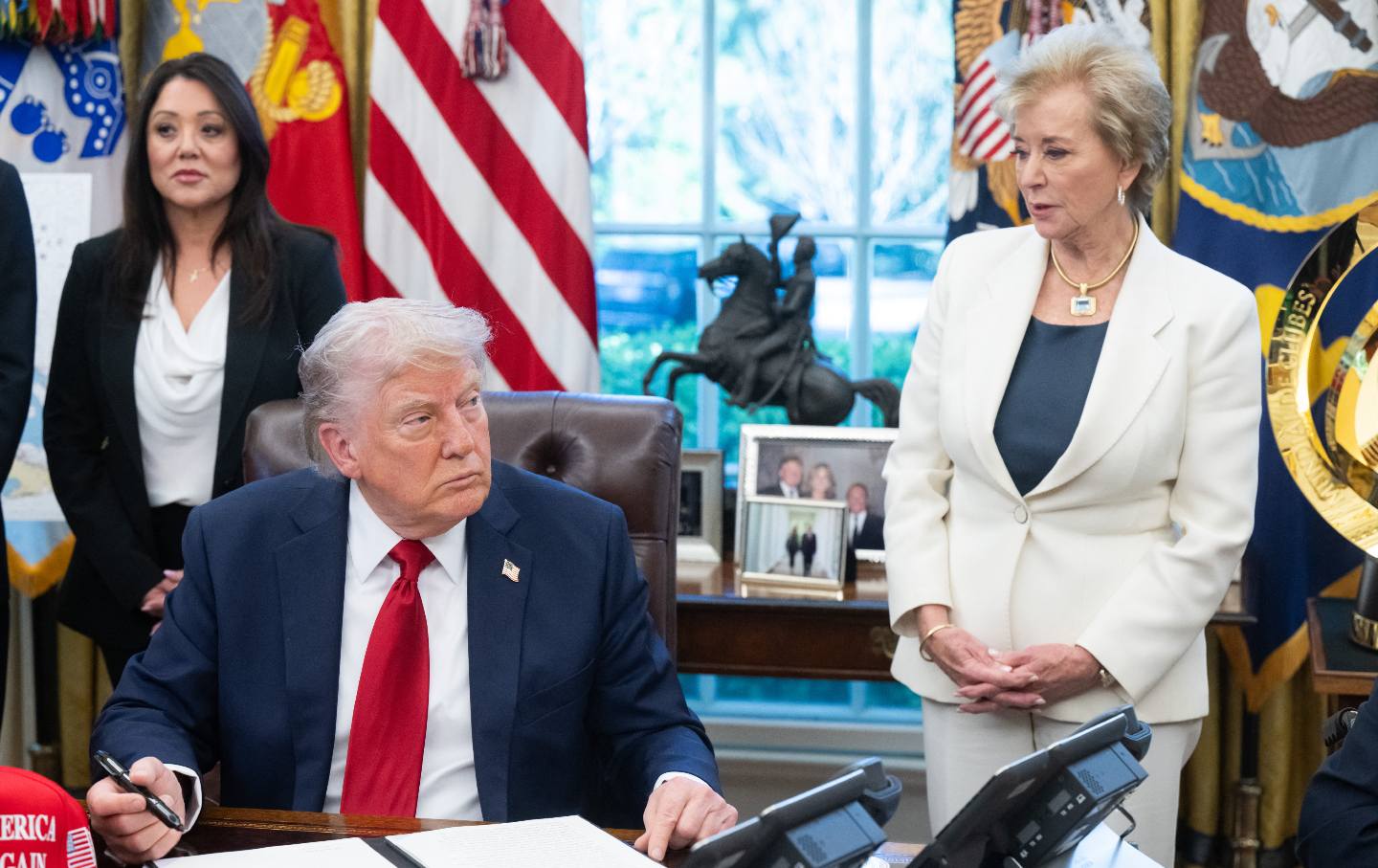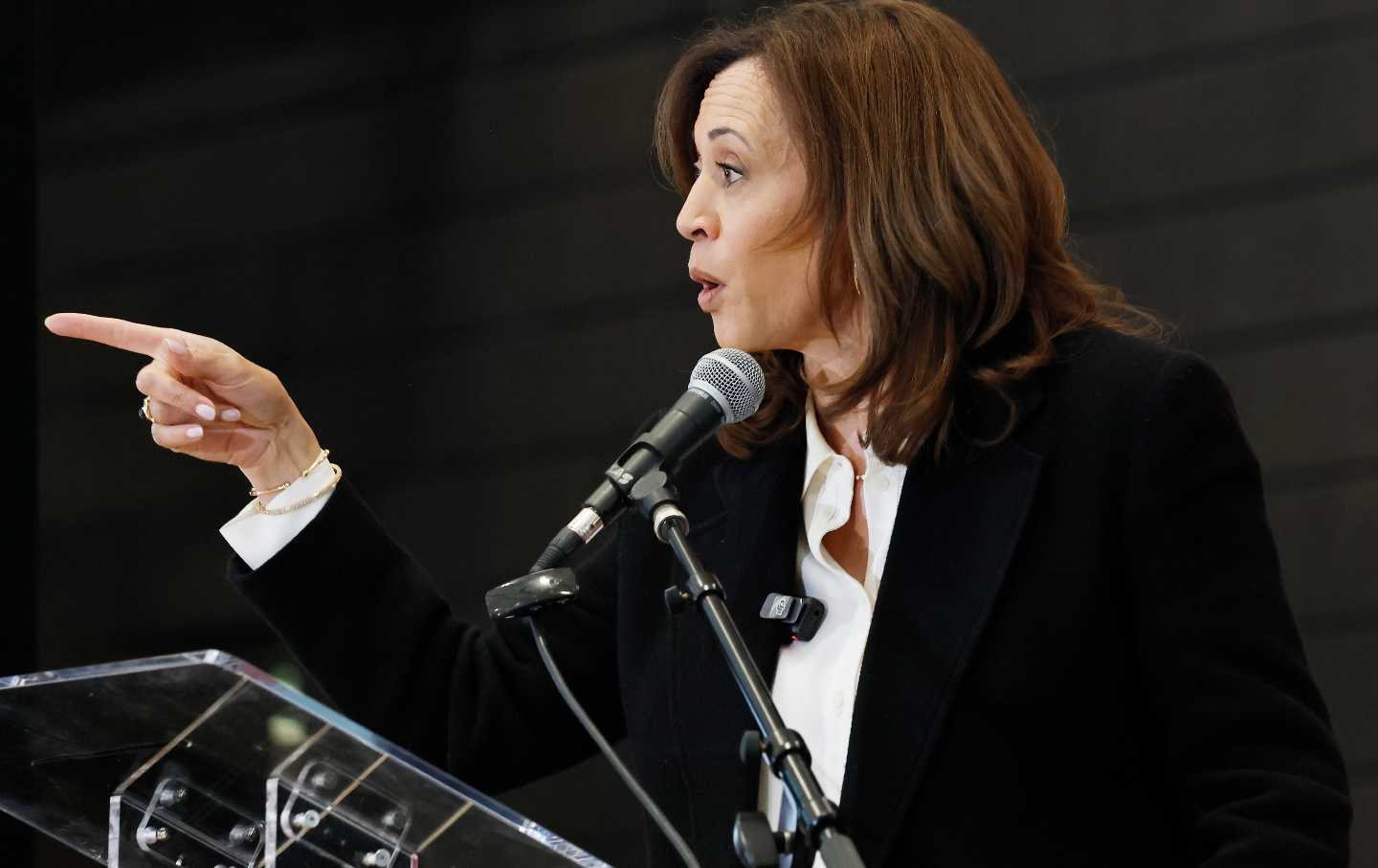Voters nominated a Republican who is “all-in for MAGA” and a Democrat who pledges to “stand up to Trump and Musk with all I’ve got.” Buckle up.

Democratic candidate for governor Representative Mikie Sherrill attends a Latinos for Mikie event at the Rancho Mateo restaurant.
(Aristide Economopoulos / The Washington Post via Getty Images)
US Representative Mikie Sherrill, who swept to victory in Tuesday’s New Jersey Democratic gubernatorial primary, sought her party’s nomination as a candidate who pledged to “stand up to Trump and Musk with all I’ve got.”
Sherrill’s jabs at President Donald Trump and billionaire “special government employee” Elon Musk—or make that former “special government employee,” now that the pair have fallen out spectacularly—were featured for months in ads designed to show that the former Navy helicopter pilot and federal prosecutor would not back down in fights with the administration. That was vital messaging at a time when Trump and his congressional allies have attacked Medicaid programs that are essential to providing healthcare in the state such as New Jersey; moved to dismantle the US Department of Education and gut initiatives that support public schools; sought to gut safety-net programs in order to fund tax cuts for the billionaire class; and now threaten to arrest California Governor Gavin Newsom and other officials who follow the Constitution.
Newsom’s current fight against Trump’s decision to order Marines and the National Guard onto the streets of Los Angeles offers a powerful illustration of the role that governors are playing—and will continue to play—in the struggle to prevent a lawless federal administration from crushing the right to dissent and the ability of local officials to govern. And now New Jersey primary voters have set up a referendum on these questions.
There was little surprise in the Republican decision to nominate Trump-approved Republican Jack Ciattarelli. A three-time gubernatorial contender who once described Trump as a “charlatan” who was “out of step with the Party of Lincoln” and unfit to serve as president, Ciattarelli did an about-face this year. He begged for the president’s support, and it worked. Trump says Ciattarelli “has gone ALL IN, and is now 100% (PLUS!)” for his MAGA agenda—a fact confirmed by the Republican nominee’s pre-primary declaration, “I applaud the President for his executive decision to send in the National Guard [to LA].” While Ciattarelli was signaling that he would surrender New Jersey to the dictates of the Trump White House—even on the most fundamental of issues—the crowded field of Democratic primary contenders went another route. All were Trump critics, with Sherrill ripping into Ciattarelli’s abdication to the president. “Is he going to invite the Marines into the streets of New Jersey? This is ridiculous,” she said of her Republican rival in the days before the primary. “That’s not leadership, that’s not governing, that’s not standing up for the people you serve, that’s not talking about truth in a moment of crisis in this nation, and that is not how we’re going to go forward in this state.”
Sherrill’s message connected with the voters. On Tuesday, she won the nomination with ease, securing 34 percent of the vote to 20 percent for Newark Mayor Ras Baraka, a bold progressive who sued New Jersey’s Trump-aligned top federal prosecutor for “false arrest and malicious prosecution” after he was seized when he joined Democratic members of Congress who were conducting an oversight visit to a federal immigration detention facility. The third-place finisher, Jersey City Mayor Steven Fulop, also campaigned as a stark critic of the president, recalling in his campaign ads how he blocked the Trump organization’s development schemes in New Jersey.
The November contest between Sherrill and Ciattarelli will feature plenty of state-specific debates about issues such as housing affordability, access to healthcare, and education funding—with Sherrill adopting mainstream Democratic positions while Ciattarelli veers to the right. Yet it is no longer the case, in New Jersey or elsewhere on the 2025 electoral map, that “all politics are local.”
As in the other state that will elect a governor this fall, Virginia, New Jersey’s race will double as a high-stakes referendum on Trump and Trumpism.
That’s likely to help Sherrill mobilize a Democratic base that—if results from the April contest for the Wisconsin Supreme Court and special elections for legislative seats nationwide that have taken place so far in 2025 are any indication—is enthusiastic about pushing back against the GOP’s extremism.
Sherrill has grown into her role as an anti-Trump firebrand. After she beat a Republican incumbent for a congressional seat in 2018, the Naval Academy graduate was initially identified as one of the more centrist members of the House Democratic Caucus. Though Sherrill had come to be seen as a more mainstream Democrat during her time in Washington, her gubernatorial run initially prompted skepticism from other New Jersey Democrats, including several of her rivals, about whether she was prepared to oppose Trump as ardently as was required. (She even took hits for having been one of dozens of House Democrats who in the past had accepted a donation from a political action committee associated with Musk’s SpaceX company—money that Sherrill’s campaign ultimately donated to the Community Food Bank of New Jersey.)
But Sherrill left came out swinging in the primary campaign. Well aware of the intensity of anti-Trump sentiment among New Jersey Democrats and a growing number of independents, she aired campaign ads featuring a newspaper headline that identified her as one of Trump’s “most vocal critics” and concluded with the candidate declaring, “New Jersey will not be pushed around—not on my watch.”
As the primary campaign progressed, and as Trump acted with increasing frequency on his oligarchical and authoritarian impulses, Sherrill reminded New Jerseyans that she voted twice during the former president’s first term to impeach him. And she suggested that she could be up for doing so again.
At a central New Jersey campaign event last month, Sherrill recalled, “When I impeached the president the first time—who knew I would ever be saying…” Someone in the crowd interrupted her and said, “Do it again.” This provoked laughter, before Sherrill replied, “Yeah, exactly. We’ll see. Maybe we’ll go for the trifecta.”
At the same event, Sherrill highlighted the importance of state-based opposition to Trump, saying, “It’s up to all of us to make sure that we are there, mobilizing, bringing people together as he’s trying to divide us apart, finding ways around and, kind of, to block and tackle in the states.”
Popular
“swipe left below to view more authors”Swipe →
That edgy determination to push back against Trump became a centerpiece of Sherrill’s campaign ads, debate appearances, interviews and stump speeches. “I think the chaos that we’re seeing coming from Washington, the attacks on our economy, on our rights and freedoms, on just our core values as Americans is something that New Jerseyans are not gonna tolerate,” said the Democrat. “So here in New Jersey, we’re gonna chart a different path forward.”
More from The Nation

Terry Moran’s only mistake was speaking honestly at a time when loyalty to the presidency supersedes journalistic integrity.

The proposed budget cuts would hurt millions of Americans, as the typical borrower with a college degree will see their student loan payments spike more than $2,928 per year.

Populists and abundance proponents have retreated into factional warfare. But both sides need to realize that they need each other.



































